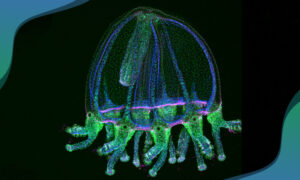
Welcome: Sagar Bhogaraju
New group leader at EMBL Grenoble is investigating the cellular role of melanoma antigens

With a diverse research background in biochemistry and structural biology, new EMBL group leader Sagar Bhogaraju is on a mission to gain a molecular understanding of a family of proteins known as melanoma antigens.
What is the focus of your research?
In my lab we’re trying to understand a family of proteins known as melanoma antigens (MAGEs); in other words, proteins expressed by certain tumours, which can trigger an immune response. They’re called melanoma antigens because they were first discovered in a melanoma patient. That was one of the first tumour antigens discovered in humans, and since then around 50 other similar proteins have been discovered. Because these antigens elicit an immune response, it’s possible to use them to develop vaccines for certain types of cancer. Most of the research is focused in this area, and there are numerous clinical trials currently in progress. What is less well known, however, is what roles these proteins have in cells. Recent papers have reported that these proteins can be oncogenic; in other words, they’re not just markers of tumours but actually have a role in the development of many different cancer types, although it’s not understood how. My lab will be focusing on gaining a molecular understanding of the cellular role of these proteins.
How did you become interested in this topic?
It started with my interest in the protein ubiquitin originally. During my PhD I was working on a very different topic, but my supervisor, Esben Lorentzen, encouraged me to consider different topics and learn different techniques for my postdoc. I consider that one of the best pieces of advice I received. At the end of my PhD I went to conferences and heard interesting talks about ubiquitin, after which I became curious about it. Ubiquitin is the first protein molecule in the cell that was discovered to be joined – or conjugated – to other proteins. I moved to Ivan Dikic’s lab for my postdoc, where I worked with fellow ubiquitin enthusiasts and learned much of what I know about cell signalling in the context of ubiquitin.
Even though it’s now more than thirty years since the discovery of ubiquitin, there are still surprising findings emerging and there’s a lot more to be discovered. The melanoma antigens that I’m working on now are a family of proteins whose role is definitely linked to ubiquitin, because they seem to be involved in activating enzymes that conjugate ubiquitin to other proteins. It’s not understood how this activation happens, and under what circumstances. These are all interesting questions that link the clinical side of things with my interest in ubiquitin. The fact that the relation between MAGEs and ubiquitin signalling is not completely understood is attractive to me. I like these problems!
What were the main challenges in the transition from postdoc to group leader?
I would say the transition period itself was challenging. During this time, you’re involved in setting up the lab. Of course, it’s very important to design the lab the way you want it to be, but it takes your focus away from science briefly and I’m not used to that. For the past ten years of my career, I’ve thought only of scientific projects and not many other factors. To continuously have to think about these organisational matters is a challenge, although things are quite streamlined at EMBL. I think it’s important to realise that it’s just a passing phase, and as soon as you have some PhD students and postdocs in the lab the science will take over.
As you build your group, what traits and skills are you looking for?
EMBL already attracts amazing talent. My criteria are simple. I’m looking for people who are highly motivated and willing to learn, and it would be wonderful if they could also bring in their own ideas. I like to be challenged, I like discussions, and I like new ideas. Having people with this kind of attitude will create a dynamic atmosphere in the lab, where the scientific discussions are very interesting and fun to be involved in.
What’s your philosophy for running your lab?
I like to let the science run the lab and drive every decision I make. Be it assigning a project, collaborating with an external group, or bringing in a new technique to the lab, people will have confidence in your decisions if your decisions have their basis in science.
What’s special about working at EMBL?
I mentioned earlier the talent EMBL attracts. I find it quite amazing to work with these extraordinary people right next to me, to have lunch with them, to have discussions, and talk about the latest technologies and developments. It’s an enriching experience. Also, the support system that EMBL has in terms of HR makes your life relatively easy and lets you focus on what’s most important, which is the science. So far, it’s been a wonderful experience to work at EMBL.
What inspires you?
For me, it’s all about reading good scientific literature. That keeps me motivated. I try to read a lot, and not only from my own field. Thinking about some great papers from the point of view of the authors makes it very interesting for me. How could they have thought of this? What would they have felt when they discovered this? Sometimes I read these old papers about the original discovery of a concept or some biological pathway. Sixty or seventy years ago, without the technology we have today, people were still able to make incredible discoveries, and reading about the history of these discoveries is fascinating for me.
What advice would you give to young scientists beginning their research careers?
It’s good to appreciate all kinds of science. Let’s say you’re a master’s student or an early PhD student: you get into a topic and that probably becomes your favourite topic (or you don’t have time to think about other topics!). But it’s good to appreciate other techniques, other kinds of research. I think that has helped me, because I changed my line of research from PhD to postdoc, and from postdoc to group leader. This keeps me on the edge. This approach could be adopted by more people, I think; it could turn out to be very rewarding in the end. There’s nothing wrong in being focused on one thing, but it’s good to attend a talk on a different subject, or maybe once in a while attend a conference that doesn’t only focus on your research topic. Keep an open mind.


